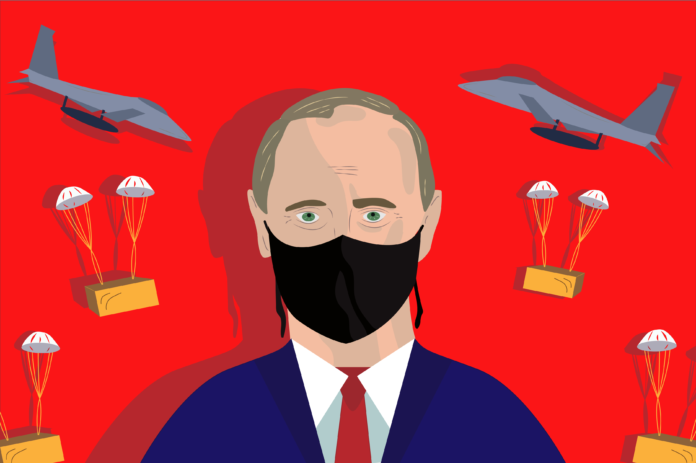The nation’s past issues with transparency may come back to haunt the government during the pandemic
“Under control” are the two words President Vladmir Putin used to describe Russia’s current management of COVID-19. And up until recently, the numbers reported seemed to be saying that too.
Despite Russia’s large population and close border with China, the number of coronavirus cases are lower than many other countries –– at one point, they were even lower than Luxembourg, a nation with only 628,000 citizens, compared to Russia’s population of 146 million.
Russian news broadcasts are evidence that the government isn’t afraid to boast its excellence during the crisis. Countless reports show Russia sending aid to suffering countries, including Italy –– a gesture that exudes confidence amid the pandemic. According to Italian newspaper La Stampa, however, 80% of the coronavirus supplies sent by Russia were “useless.”
Dr. Melita Vujnovic, the World Health Organization’s representative in Russia, asserted that the country took extensive measures early on, including testing, case identification and isolation.
As the numbers are starting to pick up, so are questions of transparency between the Russian government and its people.
“Glasnost,” which translates to “openness,” refers to the Soviet Union’s final leader Mikhail Gorbachev’s attempts to democratize and open the political systems to the people. The reform effort was catalyzed by the USSR’s poor track record of transparency, such as with the cover up of the Chernobyl nuclear catastrophe in 1986 and the country’s silent HIV/AIDS epidemic in the 1980s.
On social media, many Russians express doubts over the official number of cases, comparing the situation to the aforementioned Soviet-era cover-ups.
In Moscow, the number of pneumonia cases grew by 37% in January compared to the same time last year. Some speculate that the Russian government is misdiagnosing patients with pneumonia instead of coronavirus to keep infection numbers low.
“It’s impossible to know the real situation, but we know one thing for sure: the state is ready to manipulate medical statistics for political purposes,” said Anastasia Vasilyeva, the head of the independent Doctors Alliance trade union.
Although these theories should be taken with a grain of salt, they do have some basis in the post-Soviet era.
Back in 2015, Putin announced that he wanted to lower the death rate caused by cardiovascular disease, the country’s leading cause of death and disability. Shortly after, hospitals began reporting a drop in death rates from heart-related illnesses. At the same time, there was a rise in deaths from other causes, namely rare or unclassified diseases.
Given its history, similar manipulations are likely at work today.
In March, a 79-year-old professor died at a Moscow infectious diseases hospital. Russian officials initially attributed her cause of death to the coronavirus, but later changed it to “blood clot.”
Vasilyeva suggests that such incidents may imply either a purposeful cover-up or simply a lack of equipment, testing abilities or know-how. Still, Russia’s emergency response hasn’t been as pristine as Putin may impress upon the rest of the world.
While nations such as Uzbekistan and Kazakhstan evacuated citizens on regular planes from Wuhan, China during the initial outbreak, Russia’s government sent in two military cargo planes –– not intended to transport humans –– to evacuate its citizens.
During the 10-hour flight, small tents with buckets inside were used as restrooms, and there wasn’t any heating or air conditioning. And while citizens were informed that they’d be sent to Moscow, they were instead dropped off at a hotel outside Tyumen, a region about 1,000 miles from the capital city.
Despite opposition against the unconventional evacuation plan, the Russian state media insisted that military planes are much easier to clean and disinfect.
“Our big and great country follows a certain protocol in such emergency situations,” said Russian television presenter Evgeny Popov during a live broadcast. “The protocol says that health and safety of the citizens is the most important thing. But of course, nobody ever thinks about that. What’s more important now is to try to get some clout from the situation.”
Putin is not one to be the bearer of bad news. The virus’ effect on Russia has made that clear. Especially with cover-up claims reminiscent of the Soviet Union era, transparency and trust in Russia is clearly still an issue. In a time of global crisis, honesty and safety should be prioritized, not the finish line of a pandemic-response race.
Written by: Julietta Bisharyan — jsbisharyan@ucdavis.edu
Disclaimer: The views and opinions expressed by individual columnists belong to the columnists alone and do not necessarily indicate the views and opinions held by The California Aggie




